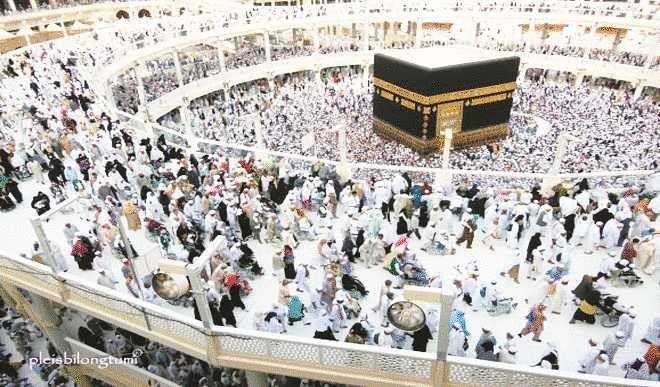Are you going on Hajj? (1)
Perhaps I should ask the opposite question: why are you not going on hajj this year? Is it because of lack of the means to do so? This indeed is a valid reason in Islam. It is they who have the means who should go on Hajj so says the Almighty (Q3: 97). An elderly […]

Perhaps I should ask the opposite question: why are you not going on hajj this year? Is it because of lack of the means to do so? This indeed is a valid reason in Islam. It is they who have the means who should go on Hajj so says the Almighty (Q3: 97). An elderly woman asked me the other day at a public lecture whether she could take a loan from a bank in order to perform Hajj. My response was simple and straightforward. Loans from Nigerian Banks, or rather conventional banks, come with strings and interests. Since the latter is forbidden by the Almighty any attempt to go against this divine injunction no matter the purpose for which the loan is taken would be tantamount to using urine to take bath. I therefore counseled the woman to live within her means. The scale of judgment for the poor on the day of resurrection is likely not to be the same as that of the rich!
But he does not intend to perform this year’s hajj for another reason: he has simply not given a thought to its urgency at all. He is of the view that those who should go to Hajj are the elderly ones; those who are close to the end of their ‘term’ on earth. Each time the sun rises in the horizon, he looks at his image in the mirror. He soon jumps to the conclusion that he still has lots of time left on the planet earth. “This guy’s still young”, he tells himself.
Ibn ‘ Abbas, may the Almighty be pleased with him, once said: “Whoever does not make pilgrimage or pay Zakat will ask to be returned to life when dying.” Someone said, “No one asks to be returned except the unbelievers”. He said, “The Almighty, says: And spend something (in charity) out of the substance which we have bestowed on you, before death should come to any of you and he should say: 0 my Lord! Why didst thou not give me respite for a little… while I should then have given (largely) in charity, and I should have been one of the doers of good. (Q63: 10)
Let us now engage our initial question. Do you plan to go on Hajj, to the sacred house of the Almighty in Kaaba this year? Are you preparing to put on the Ihram in one of the designated places (miqaat), to enter the Sacred Mosque and do the Tawaf (Circumambulation)? Do you plan to do S’ay (running) between Safa and Marwa in order to recreate the eternal fortitude and forbearance displayed by Hajar thousands of years ago? Do you plan to drink from the Zam Zam water – a miraculous stream which has been gushing forth non-stop since time immemorial? Do you plan to go out of your abode in Makkah on the 7th and 8th day of the month of Dhul Hajj in order to camp in Minnah and engage in spiritual eulogy and extra-terrestrial lullabies? Do you plan to camp on mount ‘Arafah in order to relive the day in which Prophet Muhammad delivered that memorable speech? Are you hoping to stand on mount Arafah in order to experience, ahead of time, the day of resurrection when humanity, “white”, “black”, “yellow”, “red”, rich and poor shall stand in front of the Almighty, in nudity, to account for their actions, inactions, deeds and misdeeds while on earth?
Yes. If you happen to be one of those who have registered to go on Hajj this year, then begin by acknowledging the opportunity as a privilege from the Almighty. Experience and knowledge tell us that it is not every good thing that we desire in life that we achieve; not everybody born of the union between a man and a woman shall have the opportunity to ride an airplane; not every Muslim shall have the opportunity, no matter the urge and desire, to visit the Kaaba!
But dear brother while you are packing your bags and luggage, just before you embark on the journey, pause for a moment and consider the possibility the journey could be the last one for you on earth and, by implication, the beginning of the eternal one to the Almighty. Thus intending pilgrims should repent of all sins they have committed before stepping out of their homes. If the sin is an infraction against the injunction of the Almighty, a sin you committed and about which only the Almighty is a witness you need to seek His forgiveness, regret deeply for the error and enter a covenant with your creator that should He preserve your life till you return from Hajj, that you would not travel that same heinous path again.
Now if the sin you committed is against a fellow human being; perhaps it is a sin against your parent, your co-worker, your neighbor, then you have two pathways to follow. First, if the sin has to do with the honour (‘ird) of the person in question, you should seek the latter’s forgiveness in person before you begin to seek the forgiveness of your Creator. Now, if the sin has to do with something physical, perhaps its money you unjustly appropriated or something that you know does not belong to you, return the thing to its owner, seek his forgiveness and thereafter, seek the redemption of your Creator. You cannot expect the blessings of the Almighty while your soul is unshackled by the iniquitous acquisition of worldly properties and gains.
